Business Law and Ethics: A Report on Ethical Dilemmas in Business
VerifiedAdded on 2020/06/06
|7
|1766
|87
Report
AI Summary
This report delves into the complexities of business law and ethics, examining two significant case studies: the Google memo controversy and the actions of Belle Gibson. The analysis begins by differentiating between descriptive and normative ethics, applying these concepts to the Google case and exploring the implications of moral rights in relation to the memo's author. The report then considers the ethical implications of firing James Damore, the memo's author, from a CEO's perspective. Furthermore, the report applies virtue ethics to Belle Gibson's case, evaluating her actions through the lenses of integrity, trust, and fairness. Finally, Kohlberg's theory of moral development is used to assess Belle Gibson's behavior and the resulting punishments. The report uses relevant references to support its arguments.
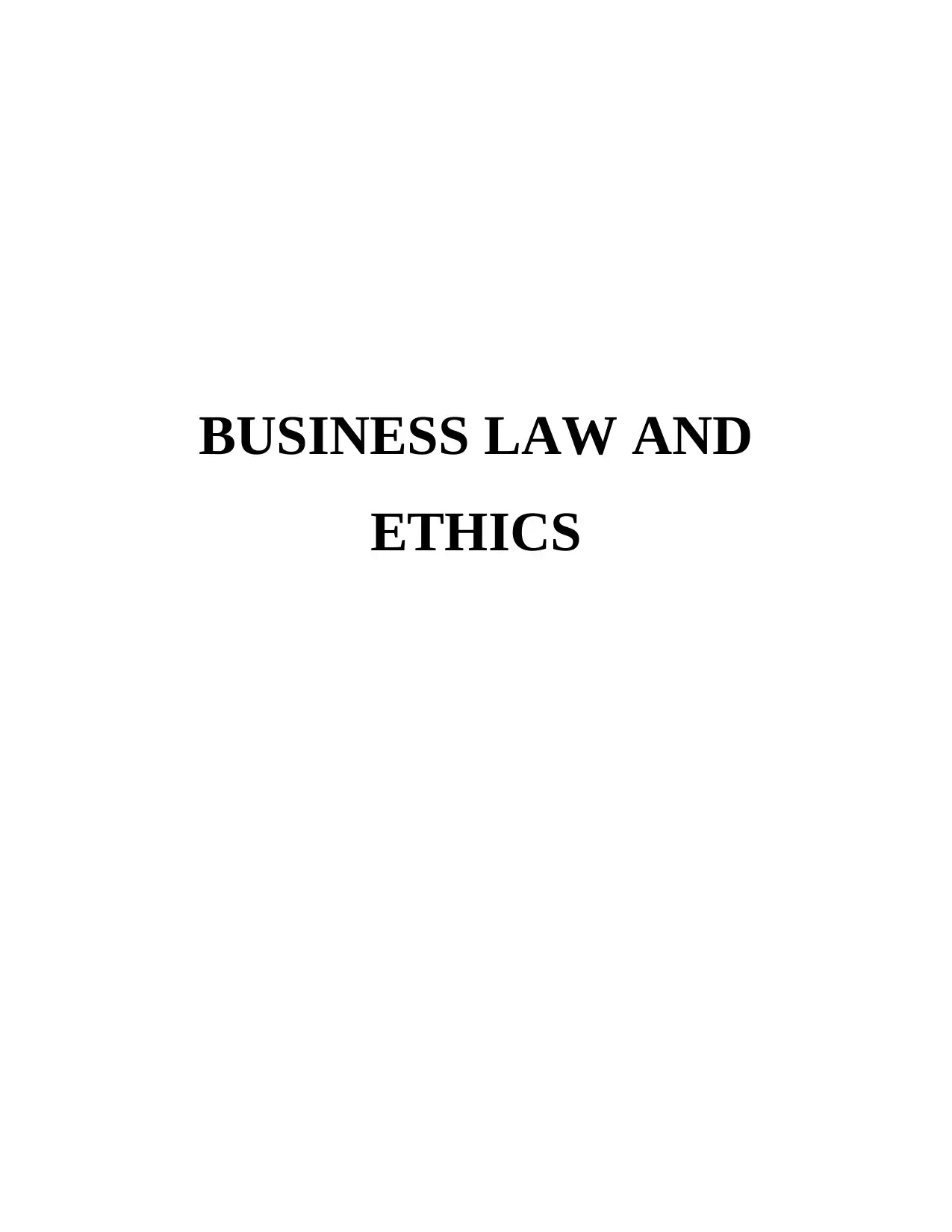
BUSINESS LAW AND
ETHICS
ETHICS
Paraphrase This Document
Need a fresh take? Get an instant paraphrase of this document with our AI Paraphraser

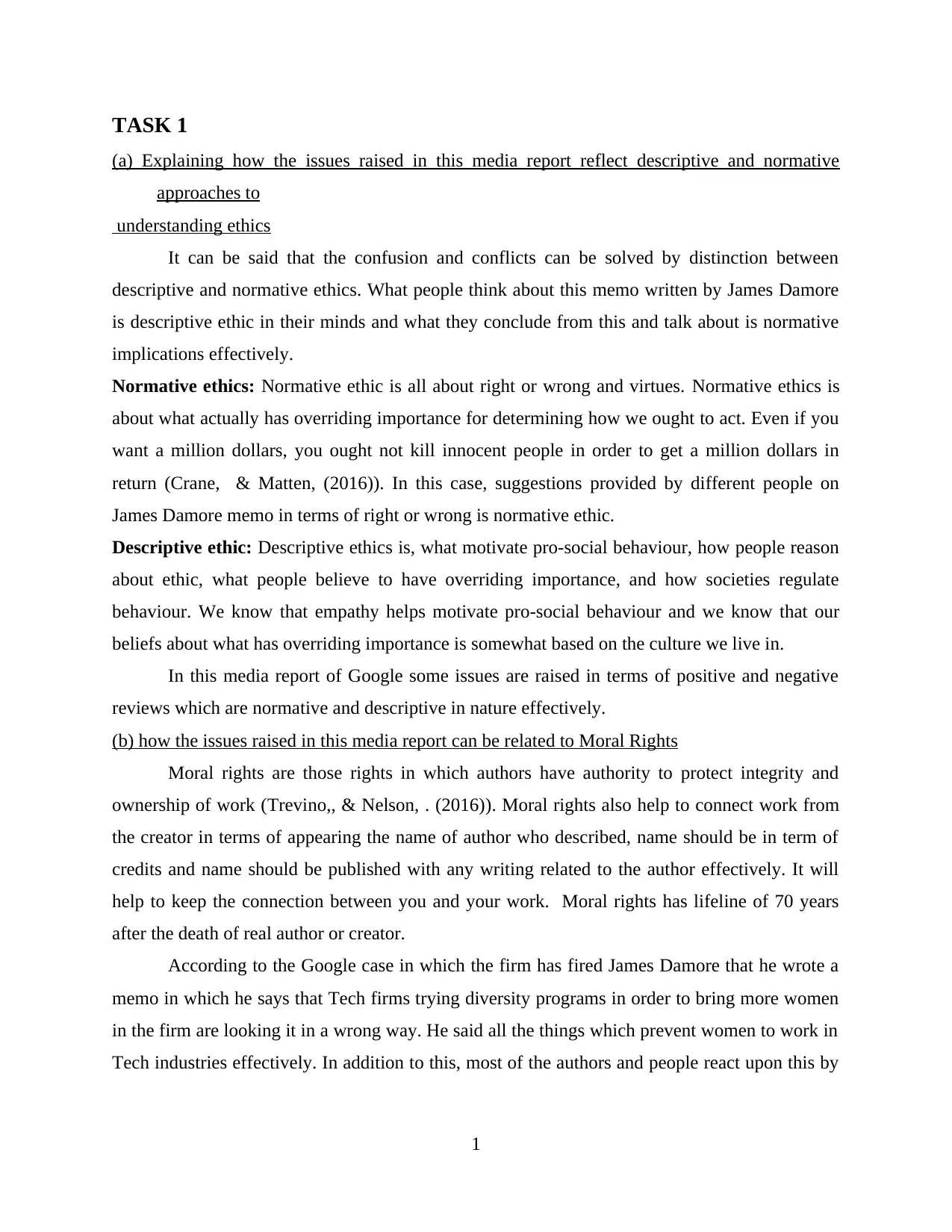
TASK 1
(a) Explaining how the issues raised in this media report reflect descriptive and normative
approaches to
understanding ethics
It can be said that the confusion and conflicts can be solved by distinction between
descriptive and normative ethics. What people think about this memo written by James Damore
is descriptive ethic in their minds and what they conclude from this and talk about is normative
implications effectively.
Normative ethics: Normative ethic is all about right or wrong and virtues. Normative ethics is
about what actually has overriding importance for determining how we ought to act. Even if you
want a million dollars, you ought not kill innocent people in order to get a million dollars in
return (Crane, & Matten, (2016)). In this case, suggestions provided by different people on
James Damore memo in terms of right or wrong is normative ethic.
Descriptive ethic: Descriptive ethics is, what motivate pro-social behaviour, how people reason
about ethic, what people believe to have overriding importance, and how societies regulate
behaviour. We know that empathy helps motivate pro-social behaviour and we know that our
beliefs about what has overriding importance is somewhat based on the culture we live in.
In this media report of Google some issues are raised in terms of positive and negative
reviews which are normative and descriptive in nature effectively.
(b) how the issues raised in this media report can be related to Moral Rights
Moral rights are those rights in which authors have authority to protect integrity and
ownership of work (Trevino,, & Nelson, . (2016)). Moral rights also help to connect work from
the creator in terms of appearing the name of author who described, name should be in term of
credits and name should be published with any writing related to the author effectively. It will
help to keep the connection between you and your work. Moral rights has lifeline of 70 years
after the death of real author or creator.
According to the Google case in which the firm has fired James Damore that he wrote a
memo in which he says that Tech firms trying diversity programs in order to bring more women
in the firm are looking it in a wrong way. He said all the things which prevent women to work in
Tech industries effectively. In addition to this, most of the authors and people react upon this by
1
(a) Explaining how the issues raised in this media report reflect descriptive and normative
approaches to
understanding ethics
It can be said that the confusion and conflicts can be solved by distinction between
descriptive and normative ethics. What people think about this memo written by James Damore
is descriptive ethic in their minds and what they conclude from this and talk about is normative
implications effectively.
Normative ethics: Normative ethic is all about right or wrong and virtues. Normative ethics is
about what actually has overriding importance for determining how we ought to act. Even if you
want a million dollars, you ought not kill innocent people in order to get a million dollars in
return (Crane, & Matten, (2016)). In this case, suggestions provided by different people on
James Damore memo in terms of right or wrong is normative ethic.
Descriptive ethic: Descriptive ethics is, what motivate pro-social behaviour, how people reason
about ethic, what people believe to have overriding importance, and how societies regulate
behaviour. We know that empathy helps motivate pro-social behaviour and we know that our
beliefs about what has overriding importance is somewhat based on the culture we live in.
In this media report of Google some issues are raised in terms of positive and negative
reviews which are normative and descriptive in nature effectively.
(b) how the issues raised in this media report can be related to Moral Rights
Moral rights are those rights in which authors have authority to protect integrity and
ownership of work (Trevino,, & Nelson, . (2016)). Moral rights also help to connect work from
the creator in terms of appearing the name of author who described, name should be in term of
credits and name should be published with any writing related to the author effectively. It will
help to keep the connection between you and your work. Moral rights has lifeline of 70 years
after the death of real author or creator.
According to the Google case in which the firm has fired James Damore that he wrote a
memo in which he says that Tech firms trying diversity programs in order to bring more women
in the firm are looking it in a wrong way. He said all the things which prevent women to work in
Tech industries effectively. In addition to this, most of the authors and people react upon this by
1
⊘ This is a preview!⊘
Do you want full access?
Subscribe today to unlock all pages.

Trusted by 1+ million students worldwide
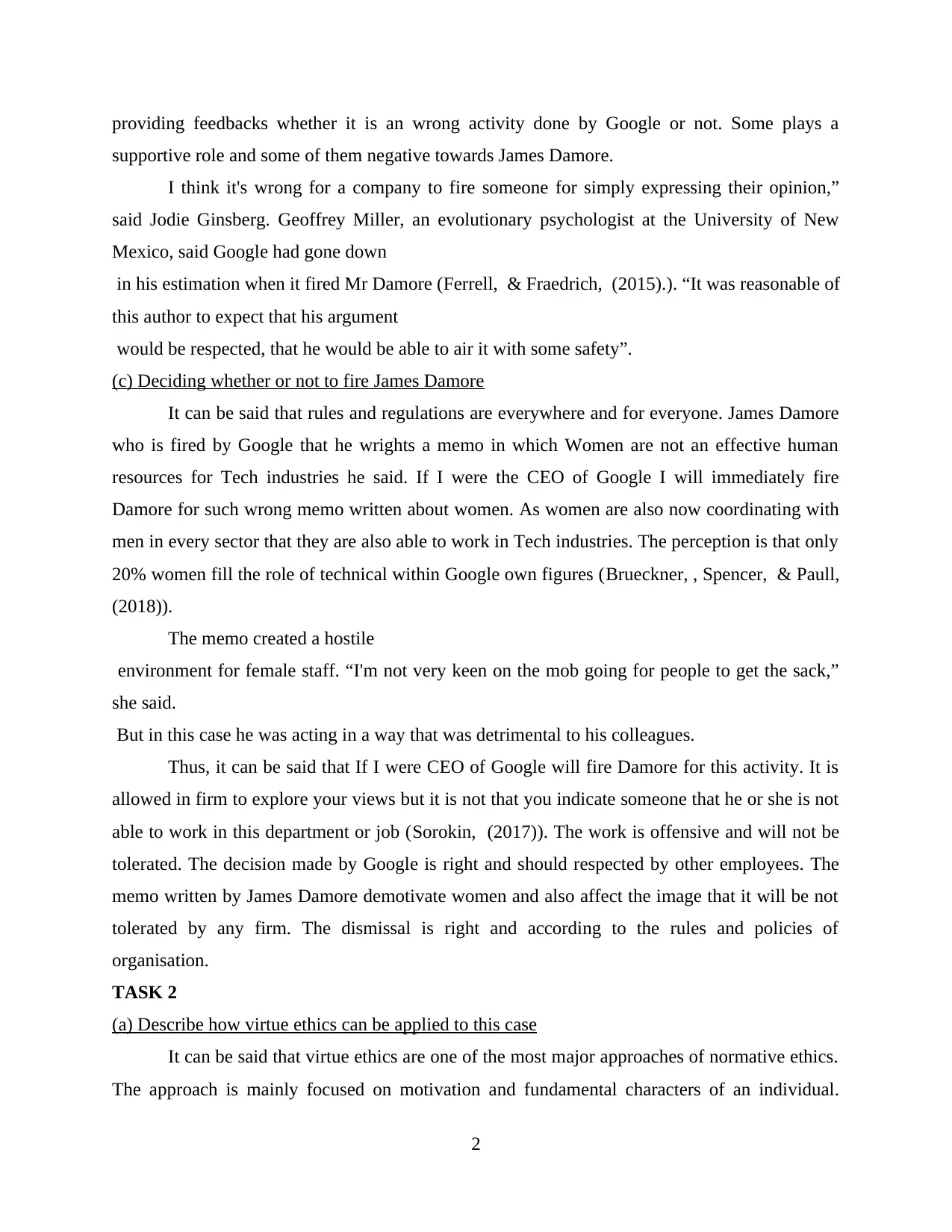
providing feedbacks whether it is an wrong activity done by Google or not. Some plays a
supportive role and some of them negative towards James Damore.
I think it's wrong for a company to fire someone for simply expressing their opinion,”
said Jodie Ginsberg. Geoffrey Miller, an evolutionary psychologist at the University of New
Mexico, said Google had gone down
in his estimation when it fired Mr Damore (Ferrell, & Fraedrich, (2015).). “It was reasonable of
this author to expect that his argument
would be respected, that he would be able to air it with some safety”.
(c) Deciding whether or not to fire James Damore
It can be said that rules and regulations are everywhere and for everyone. James Damore
who is fired by Google that he wrights a memo in which Women are not an effective human
resources for Tech industries he said. If I were the CEO of Google I will immediately fire
Damore for such wrong memo written about women. As women are also now coordinating with
men in every sector that they are also able to work in Tech industries. The perception is that only
20% women fill the role of technical within Google own figures (Brueckner, , Spencer, & Paull,
(2018)).
The memo created a hostile
environment for female staff. “I'm not very keen on the mob going for people to get the sack,”
she said.
But in this case he was acting in a way that was detrimental to his colleagues.
Thus, it can be said that If I were CEO of Google will fire Damore for this activity. It is
allowed in firm to explore your views but it is not that you indicate someone that he or she is not
able to work in this department or job (Sorokin, (2017)). The work is offensive and will not be
tolerated. The decision made by Google is right and should respected by other employees. The
memo written by James Damore demotivate women and also affect the image that it will be not
tolerated by any firm. The dismissal is right and according to the rules and policies of
organisation.
TASK 2
(a) Describe how virtue ethics can be applied to this case
It can be said that virtue ethics are one of the most major approaches of normative ethics.
The approach is mainly focused on motivation and fundamental characters of an individual.
2
supportive role and some of them negative towards James Damore.
I think it's wrong for a company to fire someone for simply expressing their opinion,”
said Jodie Ginsberg. Geoffrey Miller, an evolutionary psychologist at the University of New
Mexico, said Google had gone down
in his estimation when it fired Mr Damore (Ferrell, & Fraedrich, (2015).). “It was reasonable of
this author to expect that his argument
would be respected, that he would be able to air it with some safety”.
(c) Deciding whether or not to fire James Damore
It can be said that rules and regulations are everywhere and for everyone. James Damore
who is fired by Google that he wrights a memo in which Women are not an effective human
resources for Tech industries he said. If I were the CEO of Google I will immediately fire
Damore for such wrong memo written about women. As women are also now coordinating with
men in every sector that they are also able to work in Tech industries. The perception is that only
20% women fill the role of technical within Google own figures (Brueckner, , Spencer, & Paull,
(2018)).
The memo created a hostile
environment for female staff. “I'm not very keen on the mob going for people to get the sack,”
she said.
But in this case he was acting in a way that was detrimental to his colleagues.
Thus, it can be said that If I were CEO of Google will fire Damore for this activity. It is
allowed in firm to explore your views but it is not that you indicate someone that he or she is not
able to work in this department or job (Sorokin, (2017)). The work is offensive and will not be
tolerated. The decision made by Google is right and should respected by other employees. The
memo written by James Damore demotivate women and also affect the image that it will be not
tolerated by any firm. The dismissal is right and according to the rules and policies of
organisation.
TASK 2
(a) Describe how virtue ethics can be applied to this case
It can be said that virtue ethics are one of the most major approaches of normative ethics.
The approach is mainly focused on motivation and fundamental characters of an individual.
2
Paraphrase This Document
Need a fresh take? Get an instant paraphrase of this document with our AI Paraphraser
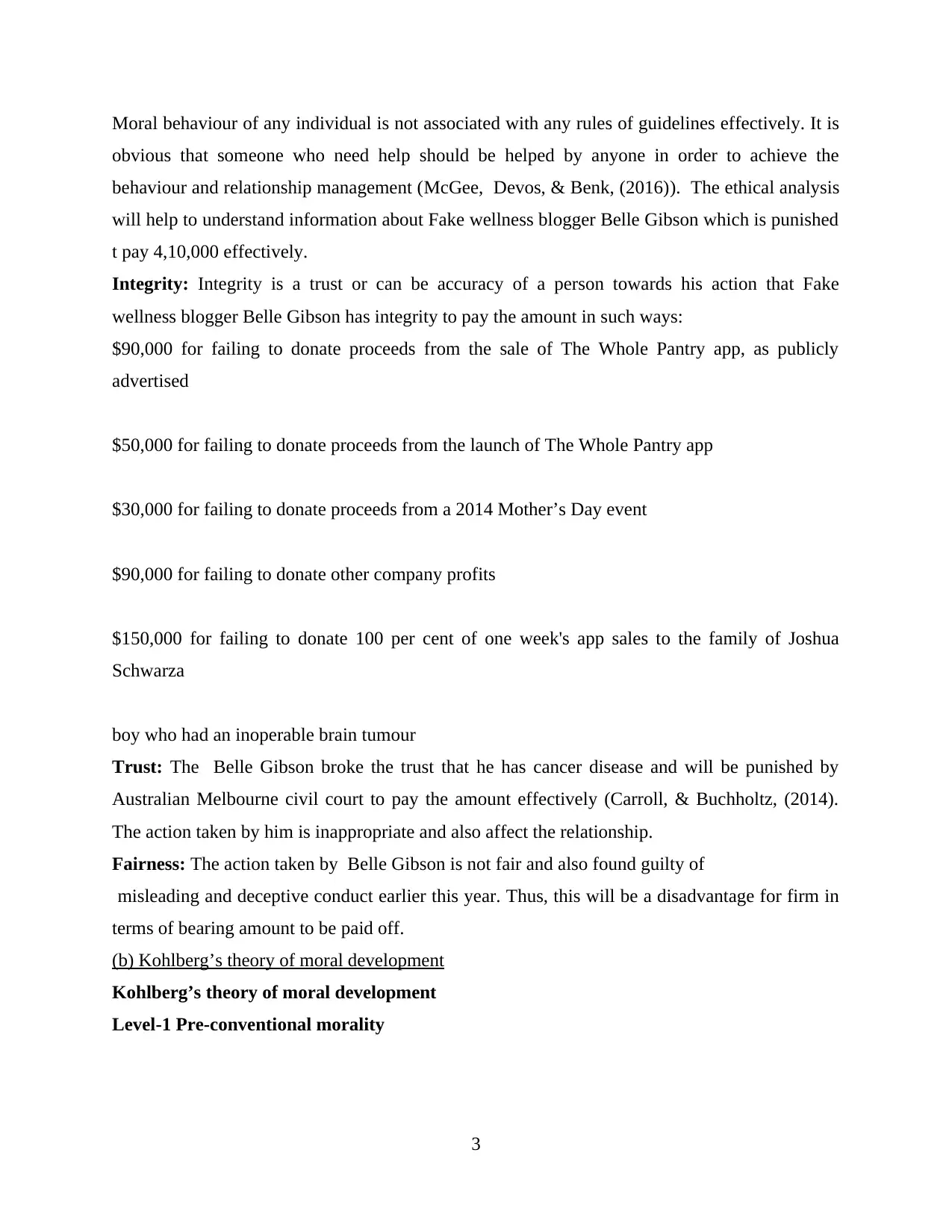
Moral behaviour of any individual is not associated with any rules of guidelines effectively. It is
obvious that someone who need help should be helped by anyone in order to achieve the
behaviour and relationship management (McGee, Devos, & Benk, (2016)). The ethical analysis
will help to understand information about Fake wellness blogger Belle Gibson which is punished
t pay 4,10,000 effectively.
Integrity: Integrity is a trust or can be accuracy of a person towards his action that Fake
wellness blogger Belle Gibson has integrity to pay the amount in such ways:
$90,000 for failing to donate proceeds from the sale of The Whole Pantry app, as publicly
advertised
$50,000 for failing to donate proceeds from the launch of The Whole Pantry app
$30,000 for failing to donate proceeds from a 2014 Mother’s Day event
$90,000 for failing to donate other company profits
$150,000 for failing to donate 100 per cent of one week's app sales to the family of Joshua
Schwarza
boy who had an inoperable brain tumour
Trust: The Belle Gibson broke the trust that he has cancer disease and will be punished by
Australian Melbourne civil court to pay the amount effectively (Carroll, & Buchholtz, (2014).
The action taken by him is inappropriate and also affect the relationship.
Fairness: The action taken by Belle Gibson is not fair and also found guilty of
misleading and deceptive conduct earlier this year. Thus, this will be a disadvantage for firm in
terms of bearing amount to be paid off.
(b) Kohlberg’s theory of moral development
Kohlberg’s theory of moral development
Level-1 Pre-conventional morality
3
obvious that someone who need help should be helped by anyone in order to achieve the
behaviour and relationship management (McGee, Devos, & Benk, (2016)). The ethical analysis
will help to understand information about Fake wellness blogger Belle Gibson which is punished
t pay 4,10,000 effectively.
Integrity: Integrity is a trust or can be accuracy of a person towards his action that Fake
wellness blogger Belle Gibson has integrity to pay the amount in such ways:
$90,000 for failing to donate proceeds from the sale of The Whole Pantry app, as publicly
advertised
$50,000 for failing to donate proceeds from the launch of The Whole Pantry app
$30,000 for failing to donate proceeds from a 2014 Mother’s Day event
$90,000 for failing to donate other company profits
$150,000 for failing to donate 100 per cent of one week's app sales to the family of Joshua
Schwarza
boy who had an inoperable brain tumour
Trust: The Belle Gibson broke the trust that he has cancer disease and will be punished by
Australian Melbourne civil court to pay the amount effectively (Carroll, & Buchholtz, (2014).
The action taken by him is inappropriate and also affect the relationship.
Fairness: The action taken by Belle Gibson is not fair and also found guilty of
misleading and deceptive conduct earlier this year. Thus, this will be a disadvantage for firm in
terms of bearing amount to be paid off.
(b) Kohlberg’s theory of moral development
Kohlberg’s theory of moral development
Level-1 Pre-conventional morality
3
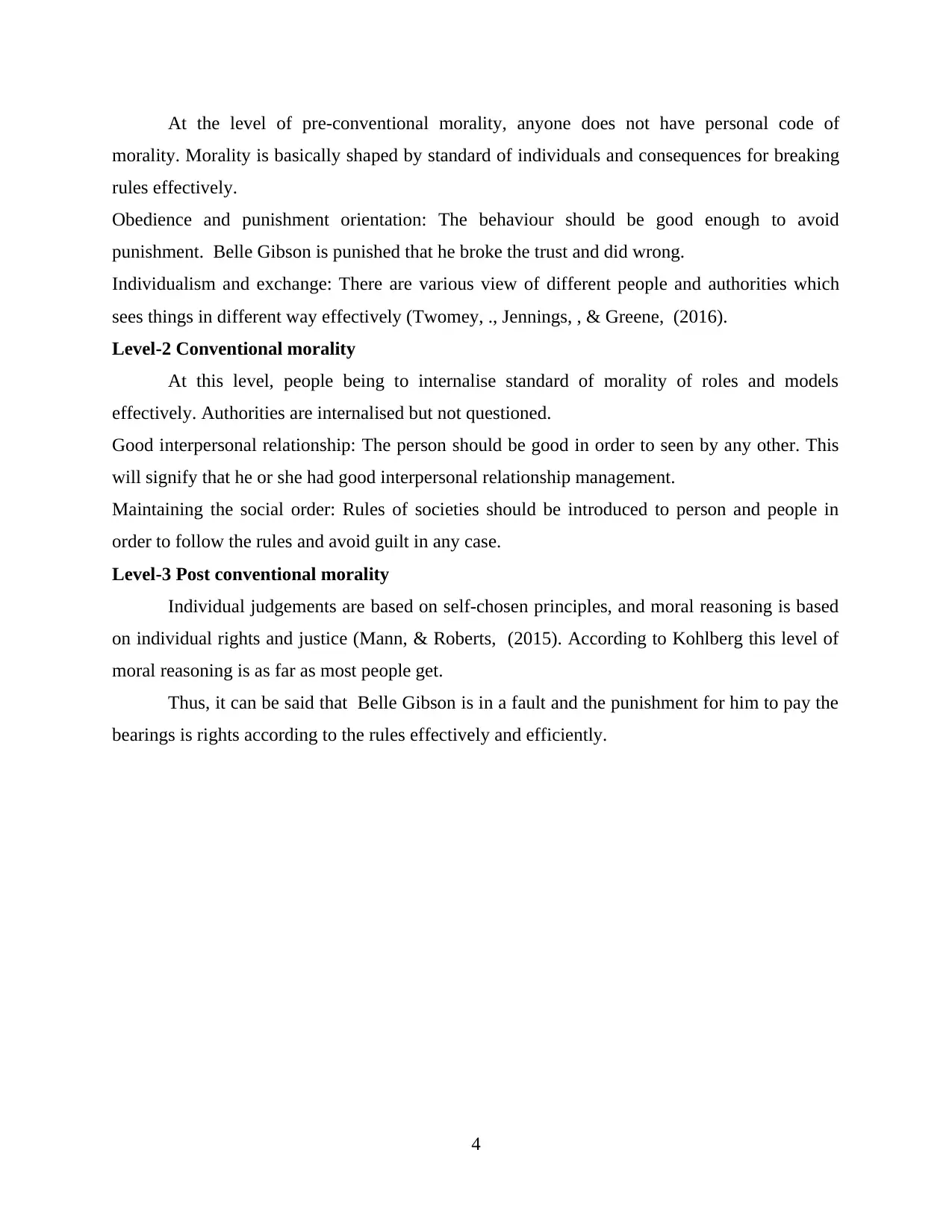
At the level of pre-conventional morality, anyone does not have personal code of
morality. Morality is basically shaped by standard of individuals and consequences for breaking
rules effectively.
Obedience and punishment orientation: The behaviour should be good enough to avoid
punishment. Belle Gibson is punished that he broke the trust and did wrong.
Individualism and exchange: There are various view of different people and authorities which
sees things in different way effectively (Twomey, ., Jennings, , & Greene, (2016).
Level-2 Conventional morality
At this level, people being to internalise standard of morality of roles and models
effectively. Authorities are internalised but not questioned.
Good interpersonal relationship: The person should be good in order to seen by any other. This
will signify that he or she had good interpersonal relationship management.
Maintaining the social order: Rules of societies should be introduced to person and people in
order to follow the rules and avoid guilt in any case.
Level-3 Post conventional morality
Individual judgements are based on self-chosen principles, and moral reasoning is based
on individual rights and justice (Mann, & Roberts, (2015). According to Kohlberg this level of
moral reasoning is as far as most people get.
Thus, it can be said that Belle Gibson is in a fault and the punishment for him to pay the
bearings is rights according to the rules effectively and efficiently.
4
morality. Morality is basically shaped by standard of individuals and consequences for breaking
rules effectively.
Obedience and punishment orientation: The behaviour should be good enough to avoid
punishment. Belle Gibson is punished that he broke the trust and did wrong.
Individualism and exchange: There are various view of different people and authorities which
sees things in different way effectively (Twomey, ., Jennings, , & Greene, (2016).
Level-2 Conventional morality
At this level, people being to internalise standard of morality of roles and models
effectively. Authorities are internalised but not questioned.
Good interpersonal relationship: The person should be good in order to seen by any other. This
will signify that he or she had good interpersonal relationship management.
Maintaining the social order: Rules of societies should be introduced to person and people in
order to follow the rules and avoid guilt in any case.
Level-3 Post conventional morality
Individual judgements are based on self-chosen principles, and moral reasoning is based
on individual rights and justice (Mann, & Roberts, (2015). According to Kohlberg this level of
moral reasoning is as far as most people get.
Thus, it can be said that Belle Gibson is in a fault and the punishment for him to pay the
bearings is rights according to the rules effectively and efficiently.
4
⊘ This is a preview!⊘
Do you want full access?
Subscribe today to unlock all pages.

Trusted by 1+ million students worldwide
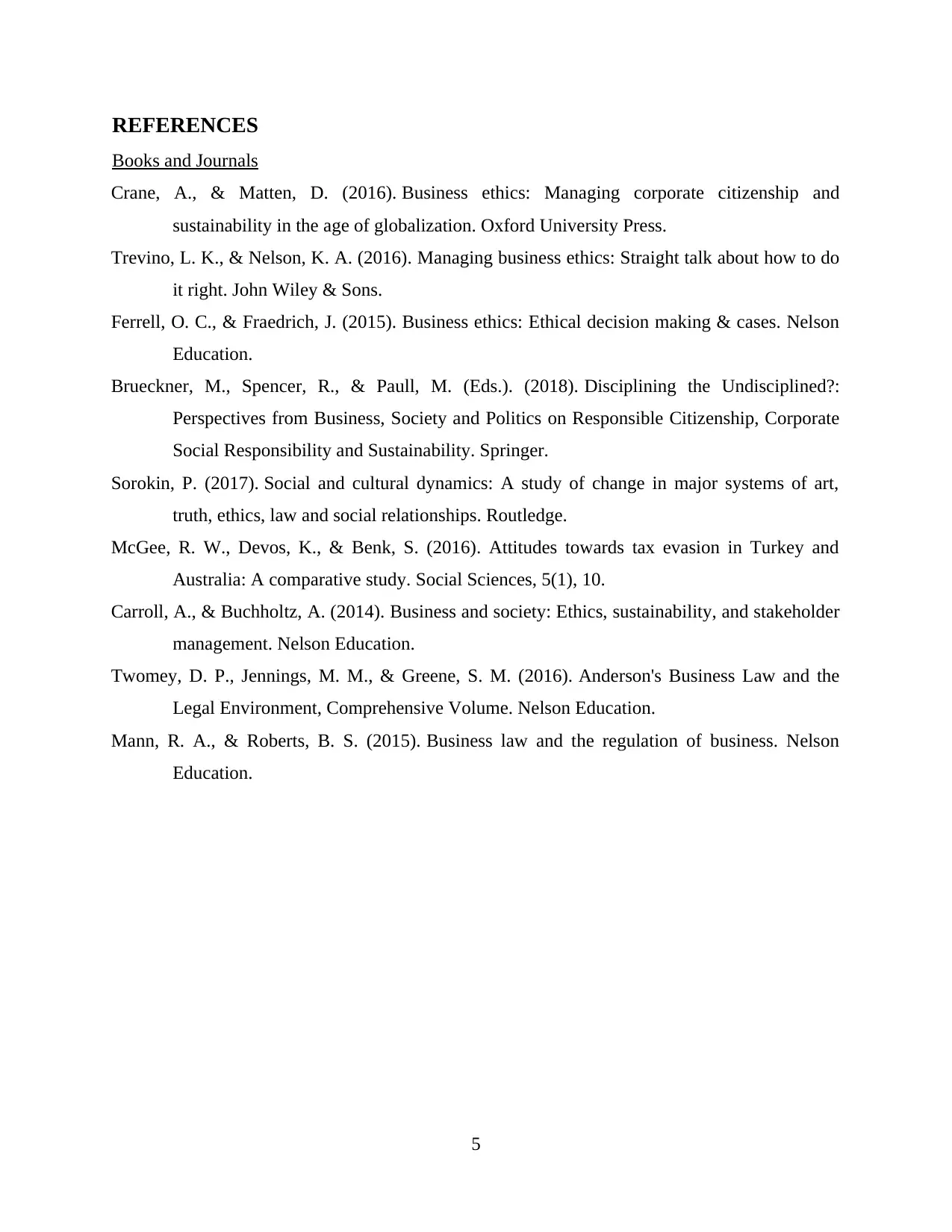
REFERENCES
Books and Journals
Crane, A., & Matten, D. (2016). Business ethics: Managing corporate citizenship and
sustainability in the age of globalization. Oxford University Press.
Trevino, L. K., & Nelson, K. A. (2016). Managing business ethics: Straight talk about how to do
it right. John Wiley & Sons.
Ferrell, O. C., & Fraedrich, J. (2015). Business ethics: Ethical decision making & cases. Nelson
Education.
Brueckner, M., Spencer, R., & Paull, M. (Eds.). (2018). Disciplining the Undisciplined?:
Perspectives from Business, Society and Politics on Responsible Citizenship, Corporate
Social Responsibility and Sustainability. Springer.
Sorokin, P. (2017). Social and cultural dynamics: A study of change in major systems of art,
truth, ethics, law and social relationships. Routledge.
McGee, R. W., Devos, K., & Benk, S. (2016). Attitudes towards tax evasion in Turkey and
Australia: A comparative study. Social Sciences, 5(1), 10.
Carroll, A., & Buchholtz, A. (2014). Business and society: Ethics, sustainability, and stakeholder
management. Nelson Education.
Twomey, D. P., Jennings, M. M., & Greene, S. M. (2016). Anderson's Business Law and the
Legal Environment, Comprehensive Volume. Nelson Education.
Mann, R. A., & Roberts, B. S. (2015). Business law and the regulation of business. Nelson
Education.
5
Books and Journals
Crane, A., & Matten, D. (2016). Business ethics: Managing corporate citizenship and
sustainability in the age of globalization. Oxford University Press.
Trevino, L. K., & Nelson, K. A. (2016). Managing business ethics: Straight talk about how to do
it right. John Wiley & Sons.
Ferrell, O. C., & Fraedrich, J. (2015). Business ethics: Ethical decision making & cases. Nelson
Education.
Brueckner, M., Spencer, R., & Paull, M. (Eds.). (2018). Disciplining the Undisciplined?:
Perspectives from Business, Society and Politics on Responsible Citizenship, Corporate
Social Responsibility and Sustainability. Springer.
Sorokin, P. (2017). Social and cultural dynamics: A study of change in major systems of art,
truth, ethics, law and social relationships. Routledge.
McGee, R. W., Devos, K., & Benk, S. (2016). Attitudes towards tax evasion in Turkey and
Australia: A comparative study. Social Sciences, 5(1), 10.
Carroll, A., & Buchholtz, A. (2014). Business and society: Ethics, sustainability, and stakeholder
management. Nelson Education.
Twomey, D. P., Jennings, M. M., & Greene, S. M. (2016). Anderson's Business Law and the
Legal Environment, Comprehensive Volume. Nelson Education.
Mann, R. A., & Roberts, B. S. (2015). Business law and the regulation of business. Nelson
Education.
5
1 out of 7
Related Documents
Your All-in-One AI-Powered Toolkit for Academic Success.
+13062052269
info@desklib.com
Available 24*7 on WhatsApp / Email
![[object Object]](/_next/static/media/star-bottom.7253800d.svg)
Unlock your academic potential
Copyright © 2020–2026 A2Z Services. All Rights Reserved. Developed and managed by ZUCOL.





